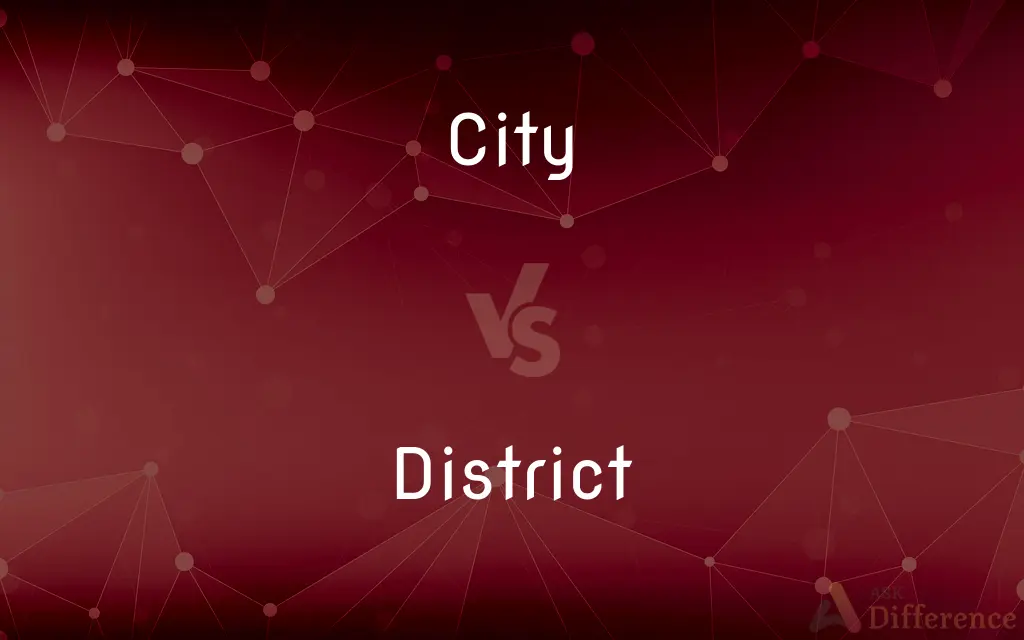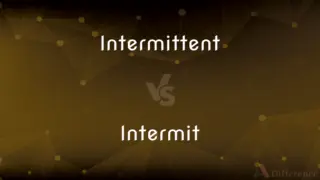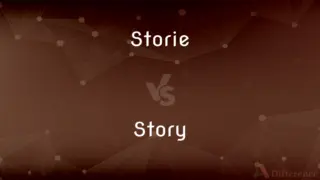City vs. District — What's the Difference?
By Tayyaba Rehman — Updated on October 2, 2023
A city is a large human settlement, often with its own local government, while a district is a specific region or area, often within a city, with defined boundaries.

Difference Between City and District
Table of Contents
ADVERTISEMENT
Key Differences
A city typically denotes a significant human settlement, bustling with commerce, infrastructure, and inhabitants, while a district is usually an administrative or geographical subdivision of a broader area, sometimes encompassing multiple cities.
In terms of governance, a city might possess its local government and administrative functions, whereas a district could be an administrative division overseen by a larger governmental body.
From a socio-cultural perspective, a city might have its distinct identity and cultural significance, but a district within a city may represent a unique cultural or community subset.
In terms of geographical distribution, while both cities and districts have defined borders, a city's expanse could contain several districts, each with its distinct characteristics.
On the global stage, a city might be recognized as a hub for certain activities or industries, whereas a district is often identified in relation to its encompassing city or region.
ADVERTISEMENT
Comparison Chart
Definition
A significant human settlement
A specific region or administrative division
Governance
May have its local government
Often overseen by a larger governing body
Identity
Distinct identity and cultural significance
Subset within larger area or city
Geographical Size
Can encompass multiple districts
Smaller, defined area within or outside a city
Recognition
Recognized globally as hubs
Identified in relation to encompassing region
Compare with Definitions
City
A large and permanent human settlement.
New York is a vibrant city known for its iconic landmarks.
District
A region defined for administrative purposes.
The school district was known for its excellent curriculum.
City
An area with its own local government.
The city council decided to renovate the parks.
District
A particular area with unique characteristics.
The historic district is a favorite among tourists.
City
A populated area with more facilities than a town.
She moved to the city for better job opportunities.
District
An area overseen by a specific governmental entity.
The district attorney will review the case.
City
A city is a large human settlement. It can be defined as a permanent and densely settled place with administratively defined boundaries whose members work primarily on non-agricultural tasks.
District
A subdivision within a larger territory or city.
The business district is always bustling with activity.
City
A large town
One of Italy's most beautiful cities
The city council
District
A district is a type of administrative division that, in some countries, is managed by the local government. Across the world, areas known as "districts" vary greatly in size, spanning regions or counties, several municipalities, subdivisions of municipalities, school district, or political district.
City
Short for City of London
District
A division of an area, as for administrative purposes.
City
A center of population, commerce, and culture; a town of significant size and importance.
District
A region or locality marked by a distinguishing feature
Went to the lake district for their vacation.
City
An incorporated municipality in the United States with definite boundaries and legal powers set forth in a charter granted by the state.
District
To mark off or divide into districts.
City
A Canadian municipality of high rank, usually determined by population but varying by province.
District
An administrative division of an area.
The Soho district of London
City
A large incorporated town in Great Britain, usually the seat of a bishop, with its title conferred by the Crown.
District
An area or region marked by some distinguishing feature.
The Lake District in Cumbria
City
The inhabitants of a city considered as a group.
District
(UK) An administrative division of a county without the status of a borough.
South Oxfordshire District Council
City
An ancient Greek city-state.
District
(transitive) To divide into administrative or other districts.
City
(Slang) Used in combination as an intensive
The playing field was mud city after the big rain.
District
(obsolete) rigorous; stringent; harsh
City
City The financial and commercial center of London. Used with the.
District
Rigorous; stringent; harsh.
Punishing with the rod of district severity.
City
A large settlement, bigger than a town; sometimes with a specific legal definition, depending on the place.
São Paulo is the largest city in South America.
District
The territory within which the lord has the power of coercing and punishing.
City
(UK) A settlement granted special status by royal charter or letters patent; traditionally, a settlement with a cathedral regardless of size.
District
A division of territory; a defined portion of a state, town, or city, etc., made for administrative, electoral, or other purposes; as, a congressional district, judicial district, land district, school district, etc.
To exercise exclusive legislation . . . over such district not exceeding ten miles square.
City
(Australia) The central business district; downtown.
I'm going into the city today to do some shopping.
District
Any portion of territory of undefined extent; a region; a country; a tract.
These districts which between the tropics lie.
City
(slang) A large amount of something used after the noun.
It’s video game city in here!
District
To divide into districts or limited portions of territory; as, legislatures district States for the choice of representatives.
City
A large town.
District
A region marked off for administrative or other purposes
City
A corporate town; in the United States, a town or collective body of inhabitants, incorporated and governed by a mayor and aldermen or a city council consisting of a board of aldermen and a common council; in Great Britain, a town corporate, which is or has been the seat of a bishop, or the capital of his see.
A city is a town incorporated; which is, or has been, the see of a bishop; and though the bishopric has been dissolved, as at Westminster, it yet remaineth a city.
When Gorges constituted York a city, he of course meant it to be the seat of a bishop, for the word city has no other meaning in English law.
District
Regulate housing in; of certain areas of towns
City
The collective body of citizens, or inhabitants of a city.
District
A division for certain purposes like elections.
Voting was in full swing in her congressional district.
City
Of or pertaining to a city.
City
A large and densely populated urban area; may include several independent administrative districts;
Ancient Troy was a great city
City
An incorporated administrative district established by state charter;
The city raised the tax rate
City
People living in a large densely populated municipality;
The city voted for Republicans in 1994
City
A hub of commerce, culture, and activity.
The city thrives due to its strategic location.
City
An area designated by legal and administrative boundaries.
The city limits were expanded to incorporate the growing population.
Common Curiosities
Can a city contain multiple districts?
Yes, a city can contain multiple districts, each with its distinct characteristics or administrative functions.
What is a city typically characterized by?
A city is typically characterized by its large population, infrastructure, commerce, and often its own local government.
Is a district always smaller than a city?
Not necessarily; a district's size varies, and while it can be within a city, it can also be an extensive region containing multiple cities or towns.
How does a district relate to administration?
A district is often a region defined for administrative, governance, or specific functional purposes.
Can a district cross the boundaries of a city?
Yes, a district can span across parts of multiple cities or even across broader territorial boundaries.
Do districts have their own legal powers?
The legal powers of a district depend on the laws of the respective country or state; some might have specific rights, while others operate under a broader governing body.
How does population factor into the definition of a city?
A city typically has a higher population compared to towns or villages, and population thresholds can sometimes determine city status in certain jurisdictions.
What is a business district?
A business district is a designated area within a city or region where a significant number of businesses, especially corporate offices, are located.
How do cities play a role in governance?
Cities often have their own local governments and administrative bodies that oversee local affairs and regulations.
Can a district have a cultural significance?
Yes, certain districts can represent unique cultural, historical, or community subsets within a larger area.
How do cities differ from towns?
Cities are generally larger than towns, have a higher population density, more infrastructure, and are often governed by their own local government entities.
Is every city divided into districts?
No, not every city is divided into districts; it depends on local administrative and geographical considerations.
How are districts determined in the context of education?
In education, school districts are defined regions where the schools within that district follow the same administrative body and curriculum guidelines.
Why are districts created within cities or regions?
Districts are created for various purposes, including administration, governance, elections, or to recognize areas with specific characteristics.
Can a city and a district have the same name?
Yes, it's possible for a city and a district to share the same name, especially if the district encompasses the entire city.
Share Your Discovery

Previous Comparison
Intermittent vs. Intermit
Next Comparison
Storie vs. StoryAuthor Spotlight
Written by
Tayyaba RehmanTayyaba Rehman is a distinguished writer, currently serving as a primary contributor to askdifference.com. As a researcher in semantics and etymology, Tayyaba's passion for the complexity of languages and their distinctions has found a perfect home on the platform. Tayyaba delves into the intricacies of language, distinguishing between commonly confused words and phrases, thereby providing clarity for readers worldwide.













































